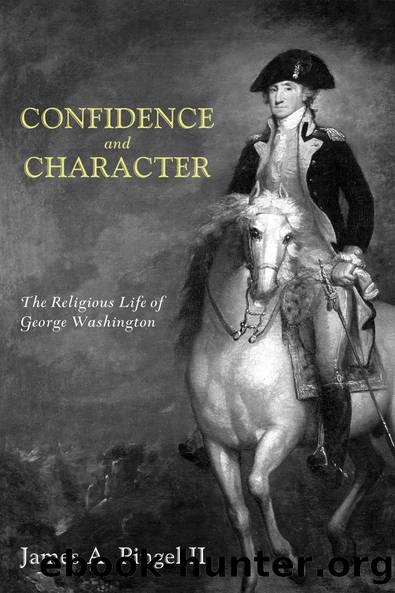Confidence and Character by Pingel

Author:Pingel [Pingel]
Language: eng
Format: epub
Tags: Religion, Christian Education, General, Education, Christianity
ISBN: 9781625648365
Google: dkwSBgAAQBAJ
Publisher: Wipf and Stock Publishers
Published: 2014-12-09T02:49:36+00:00
While he did not speak much as president of the Federal Convention in Philadelphia, Washingtonâs influence, political sentiments, and support for religion were felt and duly noted by those in attendance. Picture by John Rogers. (Courtesy of the Mount Vernon Ladiesâ Association)
The delegates created a fixed Constitution or supreme law where no civil or religious authority could transgress or contravene. Christianity, for example, would have no special privilege or place of authority in the new government. Hence, religious tests for political office were banned in the Constitution.367
Many founding fathers, including Washington, earnestly believed that religion would flourish in a society and government that promoted religious freedom. Madison, for example, regarded religion as a ânatural rightâ that the governed should never surrender. Furthermore, he argued that âtrueâ religion would triumph by its own merits if supporters were free to practice their religion without coercion.
The Constitution that Washington and other delegates constructed in no way threatened religion, but freed citizens to worship and practice their religious faith uninhibited and unencumbered. Even founders who were not overtly orthodox in their religious views believed that religion, particularly Protestant Christianity, was essential for a law-abiding nation. Most founding fathers and Revolutionary leaders correlated Christianity with good citizenship.368 As long as freedom of religion was secured and protected, religion would not need governmental or constitutional help. Liberty and religion were mutually beneficial endeavors.
American history and tradition demonstrated that nearly all of the defenders and advocates of religious libertyâindividuals such as Roger Williams, William Penn, Cecilius Calvert, and Isaac Backusâwere devout Christians. Robust support for ending government subsidies to churches came primarily from Christian denominationsâBaptists, Methodists, and Presbyterians in particular. These groups contended that tax support of churches corrupted true religion instead of promoting it. Some of Washingtonâs most ardent statements favoring religious liberty were in response to members of Christian churches who were concerned that the new federal government might abuse its power and favor one church over another.369
Eventually ratified by the states, Washington strongly endorsed the Constitution, among other reasons, because he believed it would encourage and build up a more religious citizenry. The ideas embedded in the Constitutionâlimited power, the separation of powers, the rule of the people, checks and balances, and the need for amendmentâwere necessary because people were inherently sinful and would abuse and misuse power. The doctrine of human sinfulness or depravity, a basic Christian teaching, did not stop at the boundaries of the political arena.370
Although the temptation for sinful and corrupt men to abuse religion and use it as a divisive force remained, Washington never wavered in his belief that a prosperous republic required religious citizenry. A virtuous society would not only unite and cement the bonds between American people, but also prop up and strengthen the Constitution and republican principles in general. Only a God-fearing populaceâone that both protected religious freedom and promoted the free exercise of conscience and religious practiceâwould unite the young republic.
During the intensely divisive representation debate between small states and big states at the Philadelphia
Download
This site does not store any files on its server. We only index and link to content provided by other sites. Please contact the content providers to delete copyright contents if any and email us, we'll remove relevant links or contents immediately.
| Book of Common Prayer | Catechisms |
| Devotionals | Hymns & Hymnals |
| Meditations | Monasticism & Asceticism |
| Pentecostal & Charismatic | Prayerbooks |
| Rites & Ceremonies | Sacraments |
The Secret Power of Speaking God's Word by Joyce Meyer(3154)
More Language of Letting Go: 366 New Daily Meditations by Melody Beattie(3017)
To Light a Sacred Flame by Silver RavenWolf(2808)
How Proust Can Change Your Life by Alain De Botton(2795)
Anxious for Nothing by Max Lucado(1966)
A TIME TO KEEP SILENCE by Patrick Leigh Fermor(1895)
Curse Tablets and Binding Spells from the Ancient World by Gager John G.;(1858)
The Gnostic Gospel of St. Thomas by Tau Malachi(1781)
7 Secrets of Divine Mercy by Vinny Flynn(1727)
all by Unknown Author(1674)
365 Tao: Daily Meditations by Ming-Dao Deng(1607)
From Good Goddess to Vestal Virgins: Sex and Category in Roman Religion by Ariadne Staples(1561)
100 Days of Thanks by Thomas Nelson(1554)
To Ride a Silver Broomstick by Silver RavenWolf(1548)
Anam Cara by John O'Donohue(1544)
The Fasting Edge by Jentezen Franklin(1528)
To Stir a Magick Cauldron by Silver RavenWolf(1514)
The Sacred Enneagram by Christopher L. Heuertz(1428)
New Morning Mercies by Paul David Tripp(1375)
